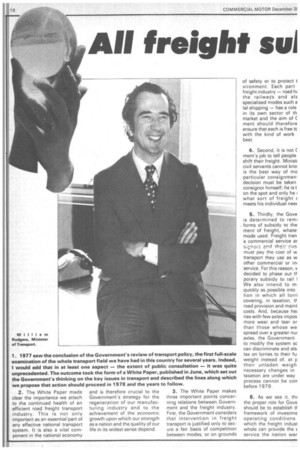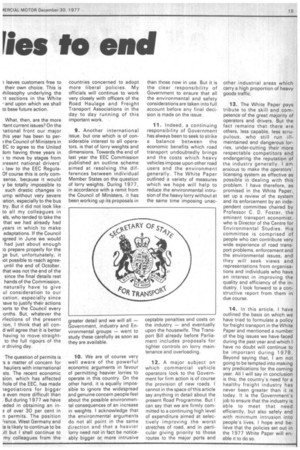All freight sul lies to end
Page 20

Page 21

If you've noticed an error in this article please click here to report it so we can fix it.
1. 1977 saw the conclusion of the Government's review of transport policy, the first full-scale examination of the whole transport field we have had in this country for several years. Indeed, I would add that in at least one aspect — the extent of public consultation — it was quite unprecedented. The outcome took the form of a White Paper, published in June, which set out the Government's thinking on the key issues in transport and described the lines along which we propose that action should proceed in 1978 and the years to follow.
2. The White Paper made clear the importance we attach to the continued health of an .efficient road freight transport industry. This is not only important as an essential part of any effective national transport system. It is also a vital cornponent in the national economy
and is therefore crucial to the Government's strategy for the regeneration of our manufacturing industry and to the achievement of the economic growth upon which our strength as a nation and the quality of our life in its widest sense depend. 3. The White Paper makes three important points concerning relations between Government and the freight industry. First, the Government considers that intervention in freight transport is justified only to secure a fair basis of competition between modes, or on grounds of safety or to protect t vironment. Each part freight industry — road hE the railwaVs and als specialised modes such a tal shipping — has a role in its own sector of th market and the aim of C ment should therefore ensure that each is free tc with the kind of work best.
4. Second, it is not C ment's job to tell people shift their freight. Ministi civil servants cannot kno is the best way of mo particular consignmen. decision must be taken consignor himself; he is t on the spot and only he , what sort of freight E meets his individual nee( 5. Thirdly, the Gove is determined to rem, forms of subsidy to the ment of freight, whate. mode used. Freight tran a commercial service ar Gnors arc' their cuS must pay the cost of w transport they use as w other commercial or in. service. For this reason, v decided to phase out tt porary subsidy to rail I We also intend to rn. quickly as possible into tion in which all lorri covering, in taxation, tlroad provision and maint costs. And, because he ries with few axles impos more wear and tear or than those whose we spread over a greater nur axles, the Government to modify the system sc can discriminate and als. tax on lorries to their fu weight instead of, at p their unladen weigh necessary changes in taxation are under way process cannot be con before 1979.
6. As we see it, thE the proper role for Gove should be to establish tt framework of investme operating conditions which the freight indusi whole can provide the E service the nation war leaves customers free to their own choice. This is ihilosophy underlying the -at sections in the White and upon which we shall to base future action.
What, then, are the more .-tant current issues? On the lational front our major this year has been to perthe Council of Ministers in EC to agree to the United lom having three years in a to move by stages from )resent national drivers' ; law to the EEC RegulaOf course this is only cornsense, because it would y be totally impossible to such drastic changes in ump without very severe ;ation, especially to the bus try. But it did not look like to all my colleagues in els, who tended to take the that we had already had years in which to make adaptations. lithe Council agreed in June we would had just about enough :o prepare properly for the je but, unfortunately, it lot possible to reach agreeuntil the end of October. that was not the e n d of the since the final details rest hands of the Commission, naturally have to give ul consideration to our cation, especially since lave to justify their actions )orts to the Council every onths. But, whatever the rfections of the present :ion, I think that all con d will agree that it is better having to move straightto the full rigours of the ir driving day.
The question of permits is .s a matter of concern for hauliers with international sts. The recent economic sion, which has affected hole of the EEC, has made legotiations for bigger s even more difficult than . But during 1977 we have .eded in obtaining an in3 of over 30 per cent in n permits. The position 'ranee, West Germany and ia is likely to continue to be J It but I shall continue to my colleagues from the
countries concerned to adopt more liberal policies. My officials will continue to work very closely with officers of the Road Haulage and Freight Transport Associations in the day to day running of this important work.
9. Another international issue, but one which is of considerable interest to all operators, is that of lorry weights and dimensions. Towards the end of last year the EEC Commission published an outline scheme aimed at resolving the differences between individual Member States on the question of lorry weights. During 1977, in accordance with a remit from the Council of Ministers, it has been working up its proposals in greater detail and we will all — Government, industry and Environmental groups — want to study these carefully as soon as they are available.
10. We are of course very well aware of the powerful economic arguments in favour of permitting heavier lorries to operate in this country. On the other hand, it is equally impossible to ignore the widespread and genuine concern people feel about the possible environmental consequences of an increase in weights. I acknowledge that the environmental arguments do not all point in the same direction and that a heavier lorry need not in fact be noticeably bigger or more intrusive than those now in use. But it is the clear responsibility of Government to ensure that all the environmental and safety considerations are taken into full account before any final decision is made on the issue.
11. Indeed, a continuing responsibility of Government has always been to seek to strike a balance between the economic benefits which road transport undoubtedly brings and the costs which heavy vehicles impose upon other road users and the environment generally. The White Paper outlined a variety of measures which we hope will help to reduce the environmental intrusion of the heavy lorry without at the same time imposing unac ceptable penalties and costs on the industry — and eventually upon the housewife. The Transport Bill already before Parliament includes proposals for tighter controls on lorry maintenance and overloading.
12. A major subject on which commercial vehicle operators look to the Government for firm action is of course the provision of new roads. I cannot in the space of *this article say anything in detail about the present Road Programme. But I can say that we are firmly committed to a continuing high level of expenditure aimed at selectively improving the worst stretches of road, and in particular giving priority to those routes to the major ports and other industrial areas which carry a high proportion of heavy goods traffic.
13. The White Paper pays tribute to the skill and competence of the great majority of operators and drivers. But the fact remains that there are others, less capable, less scrupulous, who still run illmaintained and dangerous lorries, under-cutting their more respectable competitors and endangering the reputation of the industry generally. I am anxious to make the operators' licensing system as effective as possible in dealing with this problem. I have therefore, as promised in the White Paper,. set up a review of the system and its enforcement by an independent committee chaired by Professor C. D. Foster, the eminent transport economist, who is Director of the Centre for Environmental Studies. His committee is comprised of people who can contribute very wide experience of road transport problems, enforcement and the environmental issues, and they will seek views and representations from organisations and individuals who have an interest in improving the quality and efficiency of the industry. I look forward to a constructive report from them in due course.
14. In this article, I have outlined the basis on which we have tried to formulate a policy for freight transport in the White Paper and mentioned a number of the big issues we have faced during the past year and which I have no doubt will continue to be important during 1978. Beyond saying that, I am not going to be tempted into making any predications for the coming year. All I will say in conclusion is this; the country's need for a healthy freight industry has never been greater than it is today, It is the Government's job to ensure that the industry is able to meet that need efficiently, but also safely and with minimum intrusion into people's lives. I hope and believe that the policies set out in the 1977 White Paper will enable it to do so.




























































